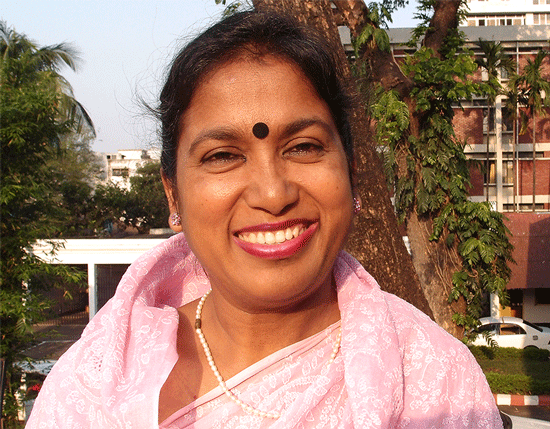Monira Begum: A life dedicated to work, family and education
Date:
Author: Thaiza Castilho
Monira Begum wakes up at seven in the morning to go to work. After a 40 minute bus ride from Narayanganj city she arrives at the National Curriculum and Textbook Board in Dhaka, where she has been working for the past nine years as a curriculum specialist. “I don’t mind commuting to work, I feel that it is worth it to spend some time in the traffic if you love your job”, she says.

She is part of a group of participants in a series of training courses organized by UN Women and the Bangladesh Climate Change Trust on mainstreaming gender in climate change actions in Bangladesh. For Monira, this type of training provides vital information whenever there is a need to draft a new syllabus or textbook: “These sessions offered tools on how to incorporate gender throughout our textbook materials, not only for climate change, but for different topics as well”.
Since March 2015, UN Women has been providing training to build the knowledge and capacity on gender, climate change and planning for more than 141 focal points within different ministries and government institutions, and give them a perspective of rights and contributions towards gender equality.
Monira, who is 48 years old, arrived in Dhaka in 2004, after majoring in sociology at Chittagong University, a renowned public research university in Bangladesh. Although her faculty in Chittagong is a 500 kilometers journey from the capital, the distance didn’t stop her when she decided to take up the position that she holds today: “It was a privilege being selected for the job and I feel very proud to work at the Board”.
In the early 70s, during the Bangladesh Liberation War, Chittagong suffered massive losses of life and in infrastructure. Following independence, the city underwent major rehabilitation and reconstruction programmes and regained its status as an important port within a few years.
“I grew up in a family of four sisters and one brother, my father was in the armed forces and my mother a housewife. I remember that right after the war, there was a lot of construction sites, me and my siblings used to walk in the streets and play in the neighbourhoods close to our home”, she says.
Monira also remembers when some of the disasters inflicted on her city: in 1991 a cyclone killed more than 138,000 people and affected millions. “I saw the impact it caused on people’s lives, many people lost their loved ones, my university was closed and there was a lot of damage to houses and businesses. It was a sad time”.
Her father passed away in 2005, following a stroke. Monira remembers that one of his dreams was to have a teacher in the family. “The day I told him that I was selected to work as an associate professor at Chittagong University I could see in his eyes that he was the happiest man alive. He was so proud of me that we laughed and cried at the same time”, she recalls.
Nowadays, Monira lives with her mother, her elder brother and sister-in-law, a niece and a nephew. They all live together to support her mother, who needs special attention because of her advanced age and limited mobility. “She cannot walk anymore, so we take turns in doing the house work. She was always there for us, it is our responsibility now”, Monira explains.
The curriculum specialist is not married and jokes that she has been married to her career. “I received many proposals from colleagues, but I think it was not supposed to happen, instead I committed to my work”, she laughs.
Monira and her sisters initially struggled as education in the past was not available equally for men and women. However, the country has been globally recognized for the progress made in improving the situation of women and girls, most notably in achieving gender parity in school enrolment in secondary, as well as primary school. Currently, the literacy rate for women aged 15-24 is 78 percent.
“My parents were simple people who did not have access to education, but they always encouraged their children to study. Today my brother is an engineer and all my sisters have finished university. I am sure they feel accomplished because of this”, she says. “They were certain that every women should be educated and there is no reason to believe this should be different now”.
When asked about what she expects for the future of women in her country, Monira concludes with a smile: “I want to see women in Bangladesh exercise their rights with dignity and respect”.
About UN Women
UN Women is the UN organization dedicated to gender equality and the empowerment of women. A global champion for women and girls, UN Women was established to accelerate progress on meeting their needs worldwide.
For more information about our work in Bangladesh, visit: http://asiapacific.unwomen.org/en/countries/bangladesh